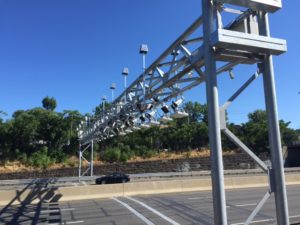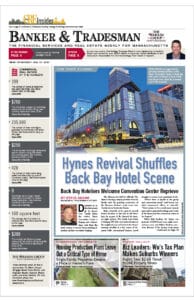Sen. Jacob Oliveira counted the dollar bills first, eight of them. Then he moved onto the dimes, eight coins clanking Thursday morning onto his desk in the Senate Chamber.
“$8.80. That’s exactly the amount of money that my constituents pay to get to this very building if they use the Massachusetts Turnpike,” the Ludlow Democrat said early on Thursday’s third day of fiscal 2025 budget sessions.
Oliveira highlighted the geographic inequity of tolls on Massachusetts highways during a 20-minute stretch in the session that previewed a debate that could engulf Beacon Hill next year: whether and how the state should raise more money for the long-term transportation infrastructure investments that are needed from Boston to Great Barrington and everywhere in between.
Toll talk picked up steam last month when Transportation Secretary Monica Tibbits-Nutt, who is leading the Healey administration’s transportation revenue task force, caused a small uproar when she told an advocacy group that the group could recommend installing new tolls at the state’s borders. Gov. Maura Healey admonished Tibbits-Nutt for the suggestion and said she won’t propose tolls at any border.
But there’s broad agreement that the state will need to figure out more ways to bring its transportation infrastructure into the 21st century and some senators – including President Karen Spilka – have made clear that tolls should be on the table.
Rejected Amendment Sought to Push Healey
Sen. Robyn Kennedy of Worcester, a city that the Mass. Turnpike skirts to the south, sparked Thursday’s mini-debate on tolls when she gave a brief speech on an amendment the Senate had rejected in a bundle with numerous others. It sought to direct the governor to seek “any and all federal approvals for a waiver to permit tolling at the borders of the commonwealth on any interstate highways that currently do not have tolling.”
“It is impossible to speak to the infrastructure and financial landscape of Massachusetts without speaking about tolling. Understanding our history and the current state of tolling in Massachusetts reveals the complex interplay of governance, finance, and equity and our transportation system,” she said before detailing the same geographic equity concerns as Oliveira. Kennedy added, “Addressing these equity issues could involve expanding tolling to other major routes, ensuring a more balanced contribution from all regions and indirectly linking the use of roads to their funding. Our transportation systems continue to be in need of significant investment across all forms, and all highways. The purpose of this amendment was to highlight that as we continue to look for sustainable funding, it is important that all drivers contribute in an equitable manner.”
Oliveira thanked Kennedy for starting the conversation around tolling equity, one he said “should be happening because the residents of my district, the residents of the gentlelady from Worcester, have long been subjected to tolling here in the commonwealth.”
“I think it’s important that every member of this chamber, as they’re traveling into the city and using a highway system if they aren’t paying tolls, to understand that my constituents, the people of Western Massachusetts, are continually subjected to tolling since the mid-1950s,” he said.
Border Legislators Oppose Idea
Sen. Paul Feeney, a Foxborough Democrat who represents what he calls the “I-95 Corridor District,” said he wanted to “plant the flag for my constituents” who live near the Rhode Island border and would be affected by tolls added there.
He said he is all for equity, but doesn’t think the way to alleviate tolling inequity is to make more people pay tolls.
“How do I as a legislator then turn to my constituents along the 95 corridor and on the Rhode Island border, and say to them, ‘that soul crushing commute that you have to deal with every single day, the lack of infrastructure improvements … well, now we’re going to charge you for the privilege of having that awful commute,'” he said.
Feeney added, “We can have a bold vision for our transportation system in Massachusetts without telling people that need to use I-95 in my district to get to work, who don’t have the choice of when they can commute in or when they can work from home, but actually have to use it to get places, that well now we’re going to charge you because people in the other parts of the states have had to pay for so long. I would say that we can figure out a way to fund our transportation system without going back to the people that can least afford it.”
GOP Leader: Cost-Savings Necessary, Too
Senate Minority Leader Bruce Tarr said he was in “complete agreement” with Feeney that “we also need to be thinking about how to lighten that burden on everyone rather than imposing it on even more people.” He agreed that Massachusetts needs a better way of financing transportation across the state but said the conversation should not ignore efficiencies and cost-saving possibilities.
“We can’t concede that the never-ending escalation of costs in Massachusetts for transportation is OK as long as we can figure out another place to put a tollbooth,” Tarr said. He added, “We can’t move forward with this conversation without remembering that, that our goal should be reducing the economic hardship for every motorist in the commonwealth.”
Tarr also flagged for senators that “there is a concern in the extreme northeastern part of the state that an additional toll would actually have a negative economic impact on folks, in many cases, that we’re trying to attract from what other people would call even further the extreme northeastern part of the state, known as New Hampshire.” The Methuen City Council this week passed a resolution opposing “any and all proposals to install passenger tolls at the borders,” according to the Eagle Tribune.
MBTA Overseers Urge More Funding
Transportation financing has been studied for years in and around state government, and the state legislature was prepared the tackle the strong debate-inducing subject right as the COVID-19 pandemic upended all priorities in 2020. Kennedy said Thursday that she was OK with her amendment being punted to a later conversation because “there are better strategies” that other states are using, including some that have been discussed on Beacon Hill previously.
“We have to pay for our roads, that’s a fact,” she said. She added, “And we know there’s other states that are doing more modern systems, right – congestion, traffic taxes or tolls, or mileage [vehicle miles traveled], there are other ways. And I am hopeful that the transportation task force that this administration has set up is going to dig into that.”
During their own meeting Thursday, MBTA overseers heard a presentation on the next five-year capital investment plan for the agency. One official said internal requests the plan does not fund totaled more than $11 billion, most of which consisted of state of good repair maintenance and modernization rather than expansions.
MBTA board member Tom McGee, a former senator who co-chaired the Transportation Committee during his time in the Legislature, lamented “a substantial lack of investment in terms of the dollars we have to do what we need to do.”
“It’s almost mind-boggling in some respects,” McGee said. “We can sit here all day and talk about all of the exciting things we can do. We need to build support beyond the Legislature to start to talk about what we need to do to create a 21st-century system.”
“The reality is we need to step up and take action as a commonwealth,” he added.
State House News Service staff writer Chris Lisinski contributed to this report.







